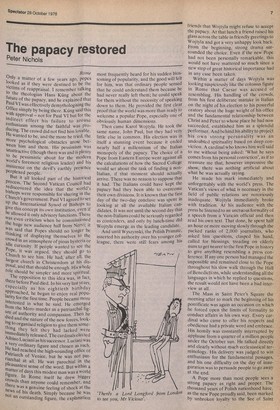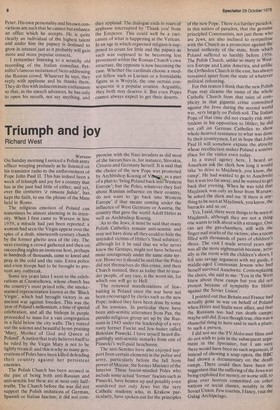The papacy restored
Peter Nichols
Rome Only a matter of a few years ago, P°Pes looked as if they were destined to be the victims of reappraisal. I remember talking to the theologian Hans Kfing about the future of the papacy, and he explained that Paul VI was effectively demythologising the Office simply by being there. Kting said this With approval — not for Paul VI but for the Indirect effect his failure to arouse enthusiasm among the faithful was Producing. The crowd did not find him lovable. He wanted to be, and the more he tried, the more Psychological obstacles arose between him and them. His pessimism was unattractive (though there was and is plenty to be pessimistic about for the modern world's foremost religious leader) and his insistence on the devil's earthly presence Perplexed people. But it all looked part of the historical Process . The Second Vatican Council had rediscovered the idea that the world's bishops were responsible for sharing in the Church's government. Paul VI agreed to set Up the International Synod of Bishops to give this concept its own institution, even if he allowed it only advisory functions. There was even criticism when he commissioned the huge new audience hall from Islervi; It was said that Popes should no longer be thinking of displaying themselves to the crowd in an atmosphere of pious hysteria or idle curiosity. If people wanted to see the PoPe, it was argued, they should go to Church to see him. He had, after all, the largest church in Christendom at his dtsPosal, and that should be enough. His whole role should be simpler and more spiritual. The opposition to this idea was, in fact, there before Paul died. In his very last years, especially as his eightieth birthday approached, he began to enjoy real popularity for the first time. People became more interested in what he said. He emerged from the Moro murder as a patriarchal figure of authority and compassion. Then he died and the nature of the new forces, looking to organised religion to give them something they felt they had lacked were immediately released. The cardinals elected Albino Lueiani as his successor. Lucian' was a very ordinary figure and chosen as such. He had reached the high-sounding office of Patriarch of Venice, but he was not patriarchal at all. He was parochial in the Pleasantest sense of the word. But within a matter of days this modest man was a world figure. In Rome itself he drew bigger crowds than anyone could remember, and there was a genuine feeling of shock at the news of his death. Simply because he was nut an outstanding figure, the explanation most frequently heard for his sudden blossoming of popularity, and the good will felt for him, was that ordinary people sensed that he could understand them because he had never really left them; he could speak for them without the necessity of speaking down to them. He provided the first clear proof that the world was more than ready to welcome a popular Pope, especially one of obviously human dimensions. Then came Karol Wojtyla. He took the same name, John Paul, but they had very little else in common. His election was in itself a stunning event because it ended nearly half a millennium of the Italian monopoly of the papacy. The choice of a Pope from Eastern Europe went against all the calculations of how the Sacred College would set about the task of finding a non Italian, if that moment should actually arrive. There was no reason to suppose that it had. The Italians could have kept the papacy had they been able to overcome their own divisions. It is known that the first day of the two-day conclave was spent in looking at all the available Italian candidates. It was not until the second day that the non-Italians could be seriously regarded as contenders, and only by lunch-time did Wojtyla emerge as the leading candidate. And until Wyszynski, the Polish Primate, asserted his authority over his younger colleague, there were still fears among his friends that Wojtyla might refuse to accept the papacy. At that lunch a friend raised his glass across the table in friendly greetings to Wojtyla and got a very unhappy look back. From the beginning, strong drama sur rounded the choice. Even if the new Pope had not been personally remarkable, this would not have mattered so much since a new step of great historical importance had in any case been taken.
Within a matter of days Wojtyla was looking suspiciously like the colossus figure in Rome that Caesar was accused of resembling. His handling of the crowds, from his first deliberate mistake in Italian on the night of his election to his powerful oratory about the huge weight of his office and the fundamental relationship between Christ and Peter to whose place he had now succeeded, established him as a splendid performer. And behind his ability to project his own strong personality was an undoubted spirituality based on deep conviction. A cardinal who knows him well said to me without being asked: 'What he says comes from his personal conviction', as if to reassure me that, however impressive the show, there was nothing artificial about what he was actually saying.
He made his mark immediately and unforgettably with the world's press. The Vatican's views of what is necessary in the field of public relations are notoriously inadequate. Wojtyla immediately broke with tradition. At his audience with the press he listened to an unctuous formality of a speech from a Vatican official and then read his own text. That done, he spent half an hour or more moving slowly through the packed ranks of 2,000 journalists, who asked him questions, clasped his hand, called for blessings, treading on elderly nuns to get nearer to the first Pope in history to give anything resembling a press conference. If any one person had managed the impossible and remained close to the Pope throughout his slow walk through the Hall of Benedictions, while understanding all the languages in which he replied to questions, the result would not have been a bad interview at all.
The Mass in Saint Peter's Square the morning after to mark the beginning of his pontificate was again an occasion on which he forced open the limits of formality to conduct affairs in his own way. Every cardinal who came to offer his respects and obedience had a private word and embrace. His homily was constantly interrupted by applause from a quarter of a million people under the October sun. He talked directly and clearly without much ecclesiastical terminology. His delivery was judged to win enthusiasm for the fundamental passages, and his one difficulty on the day of inauguration was. to persuade people to go away at the end.
A Pope more than most people sees a strong papacy as right and proper. The thousand years of Polish nationhood have, as the new Pope proudly said, been marked • by unbroken loyalty -to the See of Saint Peter. His own personality and his own convictions are such that he cannot but enhance an office which he accepts. He is quite clearly an individual of the highest talent and under him the papacy is destined to grow in interest just as it probably will gain more and more popular consent.
I remember listening to a scratchy old recording of the Italian comedian Petrolini's famous imitation of Nero addressing the Roman crowd. Whatever he says, they reply with applause and he thanks them. They do this with indiscriminate enthusiasm so that, as the speech advances, he has only to open his mouth, not say anything, and they applaud. The dialogue ends in roars of applause interrupted by 'Thank you' from the Emperor. This could well be a caricature of what is happening at the Vatican. In an age in which organised religion is supposed to count for little and the papacy as such was supposed to be becoming less prominent within the Roman Church's own structure, the opposite is now becoming the case. Whether the cardinals choose a modest fellow such as Luciani or a formidable figure as is Wojtyla, the one certain consequence is a popular ovation. Arguably, they both may deserve it. But even Popes cannot always expect to get their deserts.







































 Previous page
Previous page